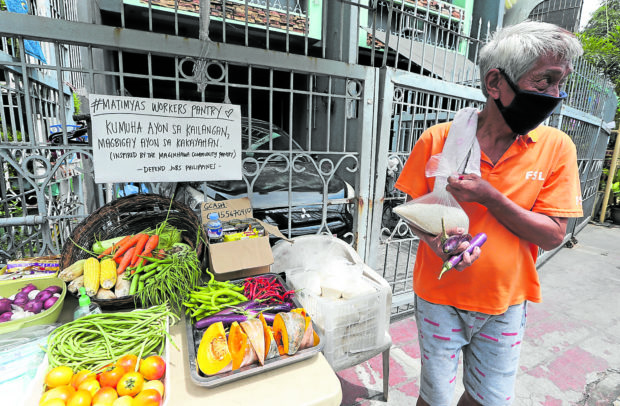
GET WHAT YOU NEED Inspired by the Maginhawa community pantry project in Quezon City, the labor group Defend Jobs Philippines has opened its own food station on Matimyas Street in Sampaloc, Manila, to help those in need. —NIÑO JESUS ORBETA
MANILA, Philippines — Community pantry organizers would need a permit from local authorities in order to ensure that social distancing and other health and safety protocols are followed, Department of the Interior and Local Government (DILG) Undersecretary for Barangay Affairs Martin Diño said Tuesday.
“Why (do they need a permit)? Una, paisa-isa lang ‘yan, ngayon, dahil i-brinoadcast na ng ating mga television network itong napaka-noble na inumpisahan dito sa Maginhawa, dinumog na ng tao. Ibig sabihin hindi na ma-control wala nang control at pati yung protocol ngayon ay na-violate na,” Diño said in an interview on ABS-CBN News Channel
(At first, only a few went there, but after the initiative in Maginhawa was featured by the media, people mobbed the place. The crowd was difficult to control, protocols have been violated.)
While the initiative of helping those in need amid the pandemic through community pantries is commendable, the DILG said it could also lead to the violation of health protocols.
“Para sa akin, ang first concern, lalo na ng barangays, kasi pwedeng makasuhan si kapitan pagka, halimbawa, nagkaroon ng mass gathering. Kahit na sabihin mo na distribution ng pagkin yan, or yung pantry yan, oras na nagkadikit dikit yung mga tao para diyan, mananagot na,” Diño said.
(For me, the first concern, especially among barangays, is the barangay captain could face charges if there’s mass gathering. Even if you say it’s a form of food distribution or it’s because of the pantry, once people start to converge, there will be accountability.)
“Yun lang naman ang iniingatan natin, wag ma-violate yung protocol dahil instead na nagbibigay ka ng pagkain baka mamaya, iyan pa ang mag-trigger para magkahawa-hawa. Ang ganda ng intensyon pero yung end result, ang iniiwasan natin yung magkaroon ng violation sa social distancing,” he added.
(What we’re trying to ensure is that protocols are not violated because instead of food distribution, it could trigger the transmission of the virus. The intention is good but we don’t want any violation of social distancing rules.)
Community pantries sprouted nationwide several days after a small business owner in Quezon City set up the Maginhawa community pantry, a bamboo cart with donated food and other essential goods.
However, the Maginhawa Community Pantry temporarily halted operations amid red-tagging fears.
Diño did not directly address issues on red-tagging when asked about this but instead maintained the need for protocols to be followed in implementing such community pantries.
“Ang tingin ko dahil nakita ko naman yung nangyari doon kay Patricia (pantry organizer), dinumog talaga, kinuyog na ng tao yung lugar dahil nga napakaganda nung ginawa niya,” he said.
Ana Patricia Non refills the Maginhawa community pantry which she set up to help people badly affected by the pandemic. The pantry accepts donations such as canned goods, vegetables, vitamins and face masks. (INQUIRER/GRIG C. MONTEGRANDE)
(I saw what happened with Patricia. People really mobbed around her pantry because what she did was really commendable.)
He advised organizers of community pantries to coordinate with their local officials for the deployment of barangay tanods, who can help in enforcing protocols.
“Ang pinakamaganda, coordinate with barangay para may nagbabantay dun sa pantry niyo, para merong titingin kung nasusunod yung protocol on social distancing…coordinate with your barangay captain, para magtatalaga si kapitan ng mga tanod,” he said.
(The best thing to do is coordinate with your barangay so that someone who would watch over your pantry, enforce social distancing rules…coordinate with your barangay captain so that they can deploy barangay personnel there.)